How A Dead Hobo Helped The Allies Win WWII

The only positive thing about being homeless in London during World War II? At least the Germans couldn't bomb your house. But between air raids and rationing, London's least fortunate were under constant threat of starvation, with not nearly enough pies on windowsills left for an enterprising '40s hobo to swipe.
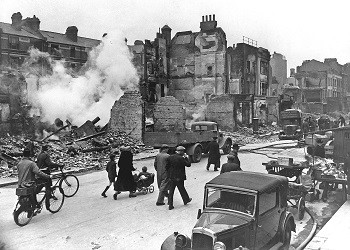
This was the story of Glyndwr Michael. Born in the small coal-mining town of Aberbargoed, Wales, Michael had lost his mentally-ill father to suicide at the age of 15. After the death of his mother in 1940, he wandered off to seek his fortune elsewhere. But in 1943, after years of hardship in wartime London, the tragic alcoholic vagrant was given the opportunity of a lifetime when the British government selected him to become a secret agent and help win the war. It's just a shame that he wasn't alive to see it.
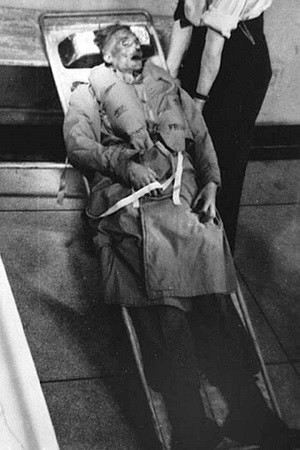
By the end of 1942, the tide of World War II was finally turning in favor of the Allies. Churchill wished to use that tide to paddle North African troops across the Mediterranean and invade the South of Europe. It was agreed that the island of Sicily was the perfect first foothold. A bit too perfect. The Nazis would see the move coming from a nautical mile away, giving them time to deploy their considerable navy and reinforce the island with the waves of Panzer dorks parked in the south of France. But what Churchill needed wasn't a new plan of attack. He needed the Nazis to have a new plan of defense.
For the invasion to work, the Allies needed to find a way to avert the ever-twitching eye of Hitler away from Sicily. The best way to do so was to make him believe that they were going to attack another Mediterranean locale. This would force the Nazis to divert troops and leave the Italian island vulnerable. For such a ruse, Churchill turned to MI5's counterintelligence division, the Twenty Committee or XX Committee (as in "double-cross," because all British spies are a bunch of Latin-speaking private school nerds). From the Committee, Prime Minister selected two of his favorite "corkscrew thinkers," Charles Cholmondeley and Ewen Montagu. They were tasked with devising a way to fool Hitler into thinking an attack on Greece was imminent. And the duo knew exactly how to do it: by using the oldest trick in the book. Specifically, the book on trout fishing.
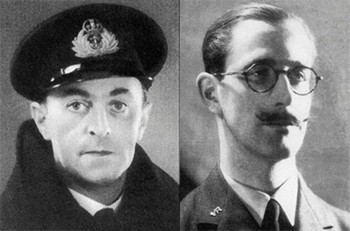
Cholmondeley and Montagu's plan to bamboozle the Nazis had its roots in a 1939 intelligence document called the Trout Memo. The memo was written as a sort of philosophical treatise that compares spycraft to flyfishing, in that you must patiently lure the enemy into taking your fake bait like a bunch of stupid ... Nazi ... trout. The memo also contained 54 example strategies. Out of these outlandish scenarios, Cholmondeley was a fan of #28. Ominously named "A Suggestion (not a very nice one)," it advises planting fake documents on a dead soldier so that the Nazis would think they got lucky intercepting a high-value courier. If that sounds like the inciting incident of a cheesy spy novel, did I mention that the Trout Memo was written by Ian 00-MF-ing Fleming? And if his overcomplicated plots were good enough for a spy like James Bond, they were good enough for Cholmondeley and Montagu.
The plan, later referred to as Operation Mincemeat, went as follows: A fake correspondence was written between Lieutenant-General Archibald Nye, vice-chief of the Imperial General Staff in London, and General Harold Alexander, the top British commander under Eisenhower in Tunisia. The letter subtly implied that the Allies were gearing up for an amphibious assault in the Balkans via Greece or Sardinia. This letter was then marked "PERSONAL AND MOST SECRET," placed in a locked attache case and handcuffed to the wrist of a corpse dressed up to look like a naval officer. Taking Fleming's fishing metaphor to the next level, this bait would then be thrown in the Mediterranean waters near Huelva, Spain -- just another officer whose plane was shot down by the Axis and then drowned. When found, the 'neutral' Spanish military (ruled by fascist fanboy Franco) would surely leak the intel to the local Nazi spy before handing the briefcase back to the British. How would they know if the Spanish had opened the documents? Some Hardy Boys shit, that's how. Montagu had slipped a single black eyelash into the envelope. If it had blown away by the time they got back the letter, they knew their wish had come true.
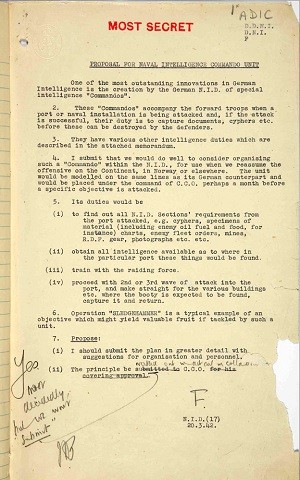
With the plan in place, all the duo needed was to gather the basic building blocks of a good con job: forged documents, a cover story, a stealth submarine, and a corpse. This is where Glyndwr Michael comes in. Right before the start of Operation Mincemeat, the Welsh wanderer had ended his life in a London warehouse fighting rats over a crust of bread. Bread that was full of rat poison. Michael's coroner labeled the cause of death to be "phosphorus poisoning. Took rat poison - bid kill himself while of unsound mind." But while in life Michael had many flaws (like not knowing and/or caring what rat poison tastes like), in death, he was deemed perfect. With no family, no friends, and, most importantly, no obvious cause of death, he was the ideal blank corpse for Operation Mincemeat. Michael was snuck out of the morgue and put on ice, a pathologist warning the spymasters they had less than three months before the body would be too badly decomposed. That gave the pair little time to devise the perfect disguise for the dead guy.
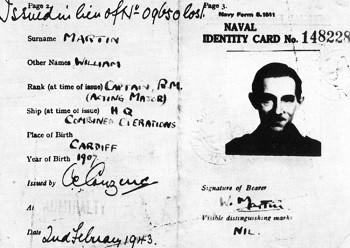
With their 00BPM cooling his heels, Cholmondeley and Montagu set about constructing the key element of their major decoy, a decoy major. Over the next three months, they spent every waking moment creating from scratch the fake identity of Captain (Acting Major) William Martin of the Royal Marines. Every single detail of Major Martin's existence was tailored to manipulate, his pockets stuffed with well-chosen personal effects. For an alibi, they included ticket stubs for a recent London show. For relatability, an angry overdraft notice from his bank. And for maximum Britishness, a stern and disapproving letter from Martin's father. They also slipped a St. Christopher's Cross around Michael/Martin's neck in the belief that Spanish coroners would be less inclined to cut open the body of a fellow Roman Catholic. And just to show off, they also gave Major Martin a doomed romance.
Among his belongings was a receipt for a diamond engagement ring, a risque picture of a pretty fiancee named Pam (Jean Leslie, an MI5 clerk) and two heartbreaking love letters in which Pam offers some clutch foreshadowing, writing: "Don't please let them send you off into the blue the horrible way they do nowadays. Now that we've found each other out of the whole world, I don't think I could bear it."

With the fake intel and fake major in place, Cholmondeley and Montagu faced their final hurdle: getting a decomposing naval spy from the center of London to the coast of Spain without anyone noticing. In the middle of the night, they sealed Michael/Martin into a special steel container filled with dry ice. To drive them out of the city, they enlisted the service of St. John "Jock" Horsfall, a former racing car champion who was slowly going blind but refused to wear glasses. After almost crashing two times, the astigmatic ace did get them to the coast in record time. Why the coast? Because actually flying over Spain and dumping the body would have been too conspicuous. Instead, it was decided that the body would be placed aboard a submarine, the Seraph, with the sub crew believing they were transporting a meteorological device for tests on the Mediterranean subterranean.

Once Michael/Major Martin was set afloat in the warm waters surrounding Spain, so too was Operation Mincemeat set afloat on the tides of fate. With Michael's body out of their hands, the British service could do nothing but to trust their assumptions would pan out and, if not, luck would carry them the rest of the way. And boy, did they needed to get lucky often. It was assumed that a stealth sub was the safer means of transporting the precious cargo. It wasn't. As a prize, the Seraph was so nice the Nazis tried bombing it twice. Once Major Martin had washed up on the shore, it was assumed that the Spanish military wouldn't just honorably hand back the secret documents. But they did, forcing the local British vice-consul to refuse to accept them(because, um, just because) and stall until the Nazi spy could arrive. They had also assumed that the coroner wouldn't be suspicious of Major Martin's corpse. But he was. While he hadn't performed a full autopsy on a fellow Pope-lover, a lifetime of dealing with drowned fishermen meant the seaside doctor immediately noted that there wasn't a single fish nibble taken out of Major Martin's exposed flesh and that his hair was in too good a condition for having spent a week underwater. But the Nazi spy, too afraid to blow his cover, never spoke to the doctor or read his report. So you could say that the CSI: Huelva-level catch was a … dead end.

Speaking of blind luck, Operation Mincemeat couldn't have wished for better marks than the Nazi chain of command in charge of verifying the documents, an epic conga-line of corruption and incompetence. The documents first made their way to the local head of German intelligence, Major Karl-Erich Kuhlenthal. Kuhlenthal was a man best described by Ben Macintyre, author of the definitive book on Operation Mincemeat, as "a one-man espionage disaster area." As a Nazi with Jewish blood, Kuhlenthal was so keen on keeping his ass off a train he didn't care if the Martin letters were legit as long as it made him seem important. Who also didn't care was the man Kuhlenthal handed the documents over to in Berlin, Baron Alexis von Roenne.
Von Roenne was the opposite of Kuhlenthal. He was a brilliant intelligence analyst and extremely thorough. He also absolutely positively hated Adolf Hitler. A devout Christian and firm opponent of the regime, many historians believe von Roenne intentionally undermined Nazi efforts by feeding his superiors bullshit intel he likely knew were Allied traps. There's every chance that von Roenne immediately saw through the Mincemeat ruse but passed it on the Fuhrer anyway because, you know, fuck Hitler.
While Churchill was in the U.S. for the Trident conference, he received a telegram that would change the war: "Mincemeat swallowed rod, line and sinker." On May 21st, Nazi orders were intercepted by British codebreakers to move an entire Panzer division from France, two from the eastern front, and most of the torpedo boats patrolling Sicily to reinforce Greece and Sardinia. By the time the Allied forces arrived in Sicily, there were barely enough Axis troops on and near the island to stop a cheap Ryanair flight of drunk British tourists, let alone a full-scale invasion. The Allies suffered only a fraction of the predicted casualties, barely lost any ships, and managed to secure the entire island in little over a month. This, in part, caused a chain of events that led directly to the end of the war. During the battle, Mussolini was removed from power in Italy. Meanwhile, Hitler, paranoid meth-head that he was, refused to believe that Greece wasn't next on the Allied agenda, causing him to double down and reroute the advance into Russia -- a blunder the Third Reich never recovered from.
While all of that was going on, in Huelva, Major William Martin was being buried with full military honors -- a pretty big step up from the London corpse pit Michael was initially headed to. Michael would remain Maj. Martin for another 53 years until the British government revealed his true identity in 1996. In 1998, the gravestone was amended with the inscription: "Glyndwr Michael served as Major William Martin, RM." In the meantime, Michael's fame had grown even more. In 1953, Ewen Montagu turned Operation Mincemeat into a bestselling novel, The Man Who Never Was, which was adapted into a movie by the same name in 1956. In 2019, it was announced that a new movie, simply called Operation Mincemeat, was in the works with an all-star cast starring Colin Firth as Ewen Montagu, Matthew Macfadyen as Charles Cholmondeley and, always the method actor, the corpse of Michael Sheen as Gwyndrl Michael.
While Michael wasn't actually in a position to refuse the call to action, that doesn't make him any less of a hero. His participation in Operation Mincemeat saved hundreds if not thousands of Allied lives on the beaches of Sicily, not to mention helped shorten the bloodiest war in human history. As important is his value as an inspirational story. The tale of Glyndwr Michael is proof for all of us seeking purpose in this cruel, uncaring life that it really is never too late to turn your life around by drinking rat poison.
For more tips on how to use trout fishing to win wars, do follow Cedric on Twitter.
Top Image: Stewart Black





